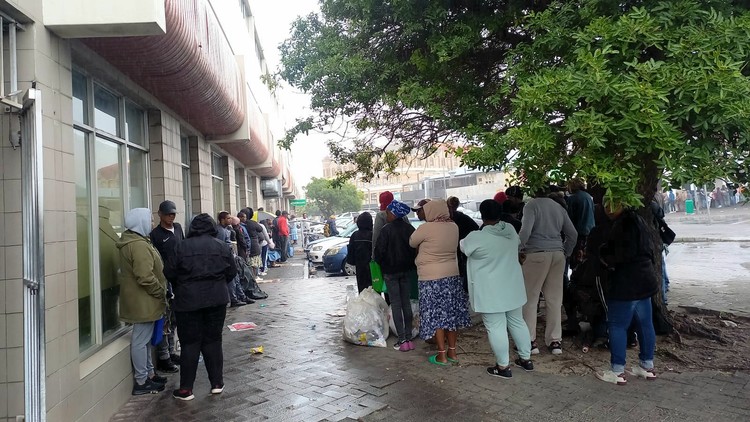
3 December 2024
On Tuesday morning, dozens of grant beneficiaries waited in the rain outside SASSA’s office in Athlone. Some arrived as early as 4am to wait in line. Photos: Marecia Damons
The South African Social Security Agency (SASSA) has hit back at recent criticism in the media, insisting that reports of widespread dysfunction at its Western Cape offices are exaggerated.
At SASSA’s briefing to the provincial legislature’s standing committee on social development on Monday, committee chairperson, Wendy Kaizer-Philander (DA), recounted the committee’s unannounced visits to SASSA offices across the province. She said members of the committee had been shocked. “We have seen the challenges firsthand, including inadequate facilities, frequent system outages, and insufficient support for people with disabilities,” said Kaizer-Philander.
SASSA’s Western Cape acting regional manager Sibusiso Nhlangothi, denied that the agency was failing to meet its obligations. “It does not go down well with us when we see in the media that SASSA is failing to do what it is mandated to do,” he said.
“From the period building up to the elections, SASSA Western Cape has been subject to scrutiny by the media. No doubt that a series of negative reports focusing on two of our local offices, namely Bellville and Eerste River, attracted attention and inevitably unwarranted criticism from various sectors,” said Nhlangothi.
GroundUp has previously published articles showing challenges faced by grant beneficiaries at the Bellville and Eerste River offices, among others.
But Nhlangothi said the media was “overstating the problem,” creating unnecessary anxiety among grant beneficiaries.
“These negative reports have led to an unfortunate conclusion that SASSA has completely failed in its responsibility to render services to the citizens of the Western Cape. We treat such a notion as a perception and reject it,” he said.
On the issue of long queues, Nhlangothi said this was inevitable. “Our work means that clients must wait in the queue for their turn before they are processed. There is nothing we can do about that,” he said.
Some grant recipients huddled under a tree to shelter from the rain on Tuesday because there was nowhere else for them to wait at the Athlone SASSA office.
SASSA admitted to challenges such as staff shortages, infrastructure issues, and office space problems. SASSA officials also highlighted technical problems, including that the system used to pay grants, SOCPEN, was frequently offline.
Griffon Pheiffer, SASSA’s provincial acting general manager of grants, explained that staff use manual systems during outages but acknowledged that this extends turnaround times. Between April and September, SASSA lost about 14 days in total with the SOCPEN system because of system challenges, and about 36 days over the same period because of challenges with its internal online system, said Pheiffer.
The agency also reported delays in securing adequate office space due to prolonged lease approval processes. “Since 2007, we established two procurement instructions for Gugulethu, but to date, have not yet found accommodation,” said Ntsietso Sesiu, provincial acting general manager for corporate services.
For its Khayelitsha office, Sesiu said, “Adverts were put out in 2021, but to date we still have not secured any accommodation”. Sesiu said SASSA plans to set up prefabricated offices near the Khayelitsha police station.
MPLs Rachel Windvogel (ANC) and Memory Booysen (DA) raised concerns about unmanageable queues and inadequate waiting spaces for beneficiaries at offices they visited.
Booysen suggested a priority system. “We’ve experienced cases where people waiting in the queue were cut off twice. Shouldn’t there be a system where you get preference the next day, based on being affected by a cut-off that same week?” he asked.
SASSA promised the committee that it would address its shortcomings through initiatives like extending office hours, conducting outreach programmes and digitising grant applications.